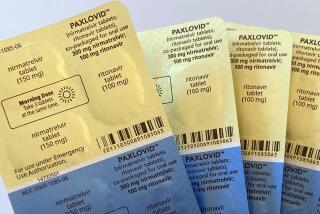Study Raises Doubt on Anti-Clotting Drug
- Share via
To the surprise of researchers, a major study has found no benefit -- and perhaps some harm -- from adding the anti-clotting drug Plavix to aspirin in an attempt to prevent heart attacks in people at high risk.
Plavix has previously been shown to significantly reduce the risk of heart attacks in people who have already had one, and physicians assumed it would be equally helpful in preventing an initial attack when given with aspirin.
But a trial in 15,603 patients at high risk of heart attack showed no overall benefit from the drug combination, researchers reported Sunday at an Atlanta meeting of the American College of Cardiology. The results were published Sunday in the online edition of the New England Journal of Medicine and will appear in the April 20 print issue.
“Their attempt to extend those results to a larger population group failed,” said Dr. Matthew Wolff, chief of cardiovascular medicine at the University of Wisconsin-Madison. “They went for a home run and fell short of the outfield wall.”
In an accompanying editorial, Dr. Marc A. Pfeffer of Harvard Medical School and Dr. John A. Jarcho of Brigham and Women’s Hospital in Boston wrote: “The absence of a clear benefit, in terms of clinical outcome, coupled with the increased rate of bleeding ... argues against the use of dual [anti-clotting] therapy in this patient population.”
The researchers found that the drug appeared to have a modest benefit in a subgroup of patients who had heart disease but had not had a heart attack. Critics said the benefit was not large enough to offset the expense of the drug and the increased risk of bleeding -- always a risk with anti-clotting agents, including aspirin.
The increased bleeding rate “might even temper enthusiasm among those [physicians] using it now,” Wolff said.
The finding was considered a major setback for the drug’s manufacturers, Sanofi-Aventis and Bristol-Myers Squibb Co. Plavix, whose generic name is clopidogrel, is the No. 2 selling drug in the world, with $6.2 billion in revenue, and some analysts had predicted that sales might double if the study results showed a benefit. The drug costs $4 per pill.
The study enrolled patients who either had heart disease or multiple risk factors, such as diabetes, hardening of the arteries, high blood pressure and high cholesterol. The patients were randomly assigned to receive daily doses of either low-dose aspirin plus clopidogrel or aspirin plus a placebo.
Dr. Deepak L. Bhatt of the Cleveland Clinic, a leader of the study, said that after an average of 28 months, 7.3% of those receiving only aspirin had suffered a stroke or heart attack or had died, compared with 6.8% of those receiving aspirin and clopidogrel -- a difference that was not statistically significant.
However, when the researchers looked at the patients grouped by symptoms, they found slightly different results, Bhatt said.
When they looked at patients who had heart disease, 6.9% of those receiving clopidogrel and aspirin had a stroke or heart attack or died, compared with 7.9% of those receiving only aspirin, a modest but statistically significant improvement.
That finding suggests that “combination anti-platelet therapy might be useful in a large new group of patients, those with established cardiovascular disease,” Bhatt said. But he added that additional clinical trials would be necessary to demonstrate such a conclusion.
The results “add to the growing body of evidence regarding the safety and efficacy of combination anti-platelets for high-risk patients with symptomatic vascular disease,” said Dr. Ralph Sacco, a spokesman for the American Heart Assn. Those patients “did significantly benefit from the combination over aspirin alone,” he said.
But when the researchers looked at patients who had risk factors for heart disease but were otherwise healthy, the results were the opposite.
About 6.6% of those who received both drugs had a heart attack or stroke or died, compared with 5.5% of those who received only aspirin. The increased risk was due primarily to bleeding.
The drug “offers no benefit whatsoever in patients only having risk factors for developing vascular disease,” Bhatt said.
Pfeffer and Jarcho cautioned against drawing significant conclusions from this type of subgroup analysis, noting that the benefits for patients who already had heart disease were “marginal.” There is “an understandable desire” to seek positive findings when the overall results are negative, they said, but there have been numerous cases in which subsequent clinical trials designed to confirm such findings have turned out negative.
Until another trial is conducted, they said, clinicians should avoid using Plavix in patients whose heart disease is stable.






